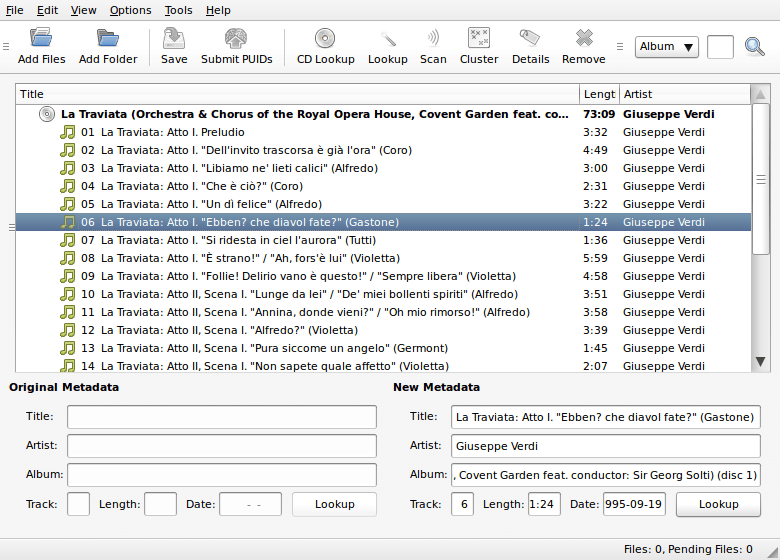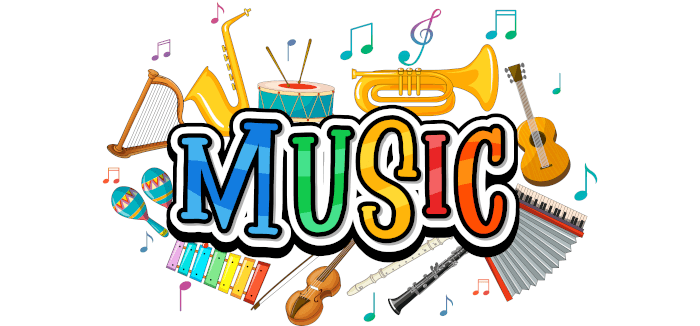MusicBrainz Picard (“Picard”) is a cross-platform, open source, MusicBrainz tag editor written in the Python programming language.
Picard is intended to be the next generation of tagger for the MusicBrainz application, with a focus on album-oriented (as opposed to track-based) tagging and cross platform compatibility.
When tagging files, Picard uses an album-oriented approach. This approach allows it to use the MusicBrainz data effectively and correctly tag your music.
Features include:
- Supports the following formats:
- MP3, TTA (ID3).
- Ogg Vorbis, FLAC, Speex (Vorbis comment).
- Musepack, WavPack, OptimFROG, Monkey’s Audio (APEv2 tag).
- AAC, ALAC (MP4).
- The True Audio.
- Windows Media Audio.
- AIF.
- m2a.
- WAV.
- Automatic identification of audio files through the MusicDNS service using the Open Fingerprint Architecture acoustic fingerprinting technology.
- Manual lookups for more control over how your files are tagged.
- Performs CD lookups and disc ID submissions.
- Cover art.
- Plugins to extend functionality such as:
- Disc Numbers – moves (disc X) from releases titles into separate tags (discnumber and discsubtitle).
- Feat. Artists – removes (feat. Artist) parts from track titles.
- Cover Art Downloader – downloads cover art for optional tag embedding and/or saving as a separate image file.
- Last.fm Tags.
- Last.fm Plus.
- Search Plugins – launches searches for clusters or releases to external non-MB websites from Picard.
- Change Encoding – converts the tags of individual files or clusters between different character encodings.
- Live syntax checking for tagger script and naming strings.
- Support for audio fingerprints using AcoustIDs.
- Support ratings.
- Support for user folskonomy tags.
- Simple scripting.
- Use a web proxy.
- Multi-platform support – Linux, Mac OS X, and Windows
MusicBrainz Picard is named after the character Captain Jean-Luc Picard from the TV science fiction series Star Trek: The Next Generation.
Website: picard.musicbrainz.org
Support: Documentation, Quick Start, FAQ, GitHub
Developer: Lukáš Lalinský, Robert Kaye, Philipp Wolfer, Sambhav Kothari
License: GNU General Public License v2.0

MusicBrainz Picard is written in Python. Learn Python with our recommended free books and free tutorials.
| Popular series | |
|---|---|
| The largest compilation of the best free and open source software in the universe. Each article is supplied with a legendary ratings chart helping you to make informed decisions. | |
| Hundreds of in-depth reviews offering our unbiased and expert opinion on software. We offer helpful and impartial information. | |
| The Big List of Active Linux Distros is a large compilation of actively developed Linux distributions. | |
| Replace proprietary software with open source alternatives: Google, Microsoft, Apple, Adobe, IBM, Autodesk, Oracle, Atlassian, Corel, Cisco, Intuit, and SAS. | |
| Awesome Free Linux Games Tools showcases a series of tools that making gaming on Linux a more pleasurable experience. This is a new series. | |
| Machine Learning explores practical applications of machine learning and deep learning from a Linux perspective. We've written reviews of more than 40 self-hosted apps. All are free and open source. | |
| New to Linux? Read our Linux for Starters series. We start right at the basics and teach you everything you need to know to get started with Linux. | |
| Alternatives to popular CLI tools showcases essential tools that are modern replacements for core Linux utilities. | |
| Essential Linux system tools focuses on small, indispensable utilities, useful for system administrators as well as regular users. | |
| Linux utilities to maximise your productivity. Small, indispensable tools, useful for anyone running a Linux machine. | |
| Surveys popular streaming services from a Linux perspective: Amazon Music Unlimited, Myuzi, Spotify, Deezer, Tidal. | |
| Saving Money with Linux looks at how you can reduce your energy bills running Linux. | |
| Home computers became commonplace in the 1980s. Emulate home computers including the Commodore 64, Amiga, Atari ST, ZX81, Amstrad CPC, and ZX Spectrum. | |
| Now and Then examines how promising open source software fared over the years. It can be a bumpy ride. | |
| Linux at Home looks at a range of home activities where Linux can play its part, making the most of our time at home, keeping active and engaged. | |
| Linux Candy reveals the lighter side of Linux. Have some fun and escape from the daily drudgery. | |
| Getting Started with Docker helps you master Docker, a set of platform as a service products that delivers software in packages called containers. | |
| Best Free Android Apps. We showcase free Android apps that are definitely worth downloading. There's a strict eligibility criteria for inclusion in this series. | |
| These best free books accelerate your learning of every programming language. Learn a new language today! | |
| These free tutorials offer the perfect tonic to our free programming books series. | |
| Linux Around The World showcases usergroups that are relevant to Linux enthusiasts. Great ways to meet up with fellow enthusiasts. | |
| Stars and Stripes is an occasional series looking at the impact of Linux in the USA. | |
